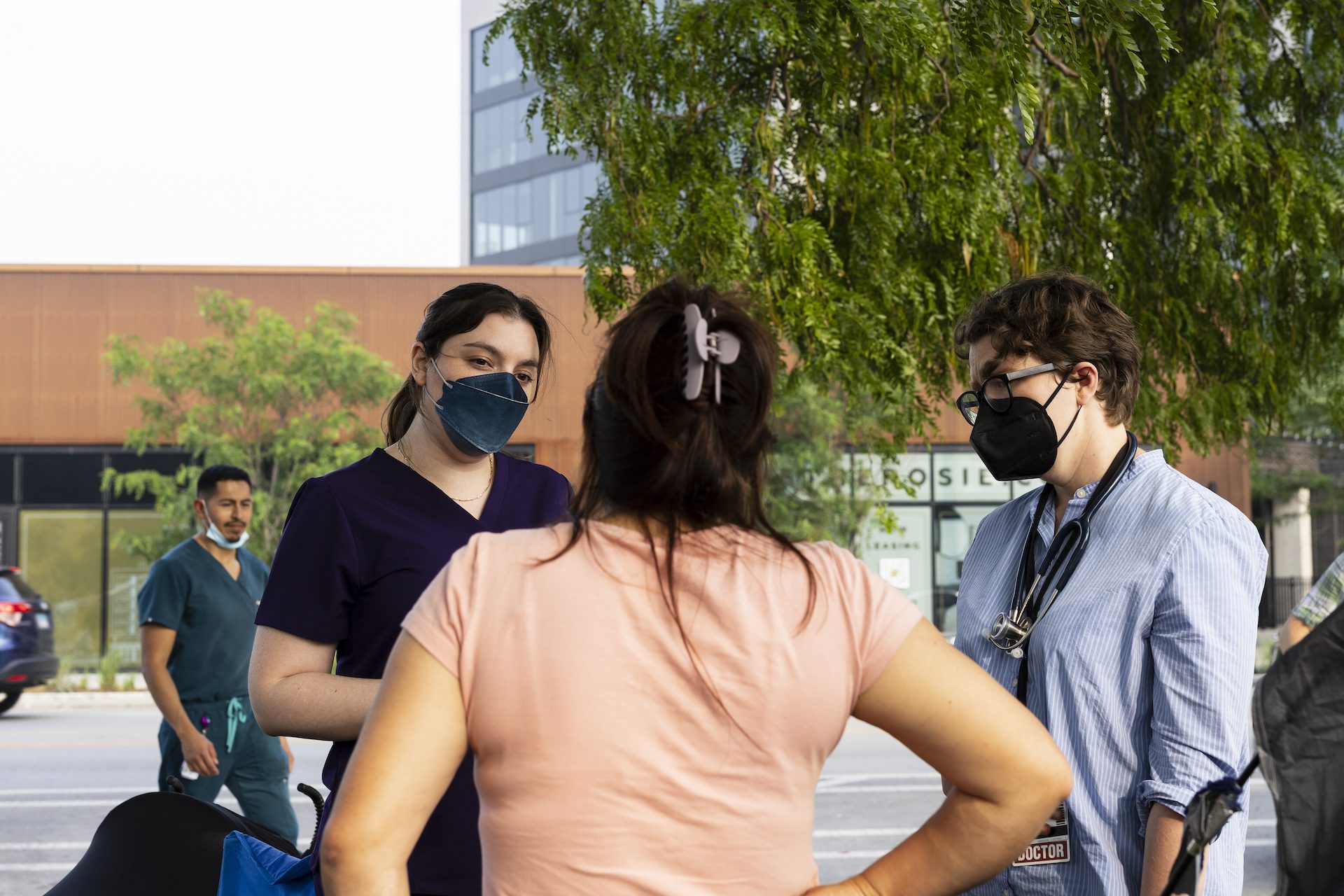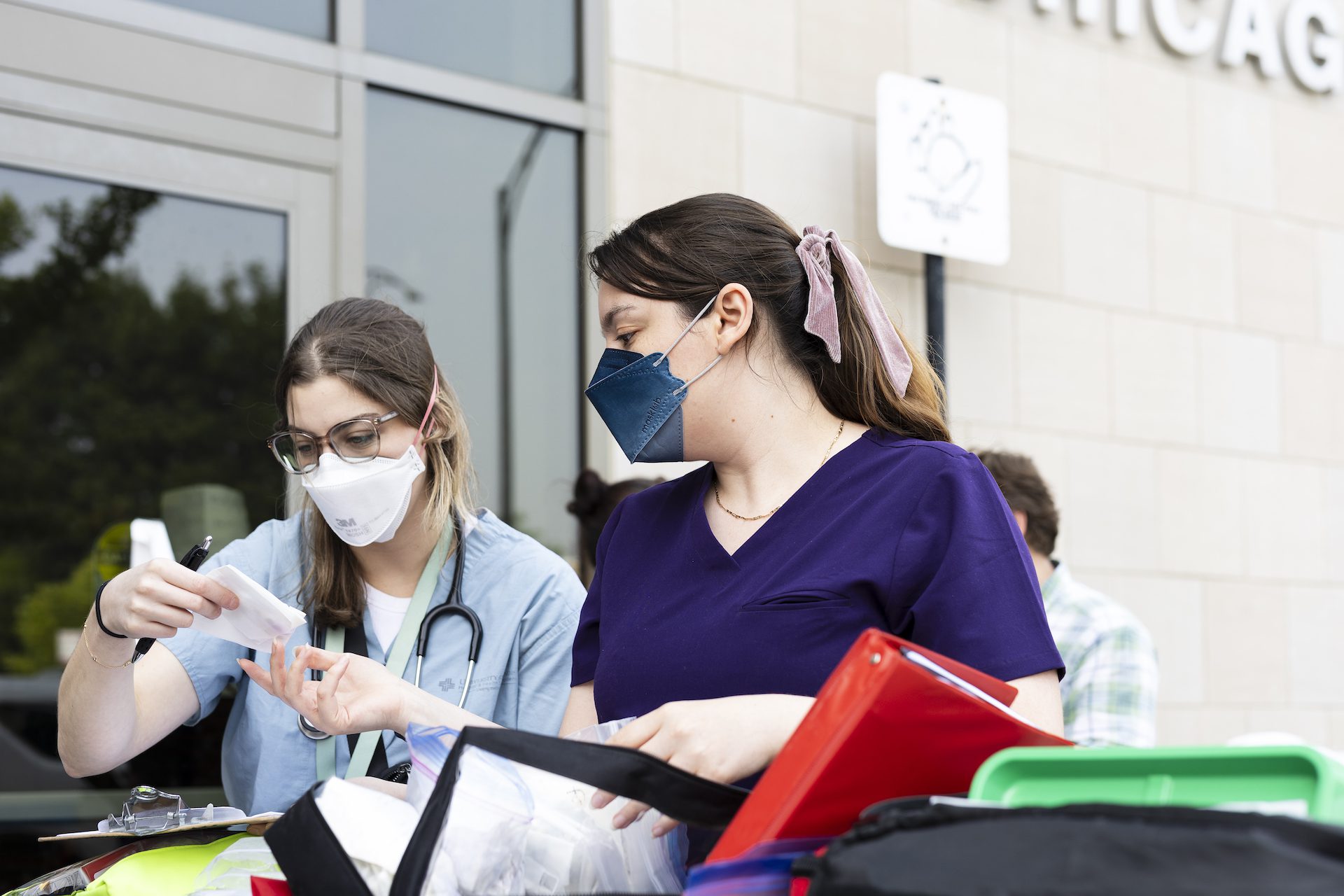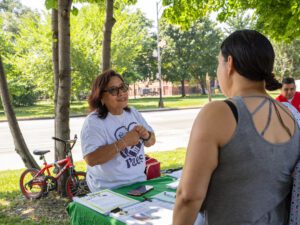 Jenny Fontaine/University of Illinois Chicago
Jenny Fontaine/University of Illinois ChicagoThe Mobile Migrant Health Team, made up of medical students and volunteers, banded together to provide medical help to noncitizens.
This story is a collaboration between Borderless Magazine and Northeastern Illinois University.
On a warm summer morning, volunteers transform a community space on Chicago’s Lower West Side into a pop-up medical clinic in an undisclosed location.
The clinic, run by the Mobile Migrant Health Team (MMHT) with support from the Figuerora Wu Family Foundation, operates smoothly with mostly volunteer medical students split into three teams functioning as receptionists, interpreters and medical providers. Over three hours, dozens of community members make their way in and out of the clinic to receive care for various health issues, including common colds and diabetes.
News that puts power under the spotlight and communities at the center.
Sign up for our free newsletter and get updates twice a week.
In nearly two years, MMHT’s free biweekly pop-up clinic, Clinica Nuevas Raices, has become an entry point into the American health care system for many immigrants. For migrants and non-citizens, MMHT emerged as a beacon of hope. Now, it’s become a lifeline as they face fewer health care options in Illinois and the federal government carries out an aggressive immigration crackdown in the city.
Sara Izquierdo, founder and executive director of MMHT, says the clinic is a critical step for immigrant communities in need.
“My role has really expanded into identifying our patients who have either the opportunity for a life-saving or a life-prolonging procedure, and making sure that we can get that to happen as soon as possible, given the current political climate regarding immigration, ” Izquierdo said.
While the need for medical services is ever-present, the seeds of the program started a few years ago.
As the city struggled to accommodate asylum seekers and refugees being bused and flown from Republican-led states in 2022, volunteer teams provided medical care to new arrivals living inside and outside police stations across Chicago. After the death of a five-year-old migrant boy in a shelter in 2023, MMHT formalized its efforts to provide health care services to immigrants lacking adequate health resources.

Since then, volunteer medical students, overseen by physicians, have screened and treated thousands of immigrants, citizens and people experiencing homelessness at pop-up health fairs, clinics, police stations and parks. The program has evolved to advocate for patients.
“I think it’s also important to realize that for some of these patients, we’re the first people who gave them a hand up when they were in the police stations or when they were in [a] shelter,” Izquierdo said. “And then after they left shelters and after they left the police stations, we didn’t just forget about them.”
Navigating policy changes
For many immigrants and vulnerable communities, the MMHT’s pop-ups and health fairs function as a “safety net clinic,” said Elise Ogden, the organization’s clinic administrator.
According to recent MMHT surveys of clinic visitors, over 95% of patients have not seen a health care provider before visiting MMHT’s pop-up clinic.
The clinic service is becoming even more critical as immigrants in Chicago, and across the country, face targeted ICE enforcement orders by President Trump’s administration.
In July, the Centers for Medicare and Medicaid Services and the Department of Homeland Security signed an agreement, allowing private Medicaid information to be handed over to Immigration and Customs Enforcement (ICE). Medicaid, jointly funded by states and the federal government, provides health coverage to low-income adults, children, pregnant individuals and people with disabilities.
Under the agreement, ICE officials will have access to the names, addresses, ethnicity and racial information and Social Security numbers of everyone enrolled in Medicaid, according to the Associated Press.
U.S. Department of Health and Human Services Secretary Robert F. Kennedy, Jr. said the agency was “tightening oversight of enrollment” in an August press statement.
Read More of Our Coverage
While MMHT continues to provide health care services, the latest policy change has had a chilling effect on immigrant communities and inside clinics. ICE raids have made attendance inconsistent, says Dayane Padilla, an intern through the Medical Organization for Latino Advancement at MMHT.
This isn’t unique to the clinic.
Cook County Health and CommunityHealth, a free health care provider in Chicago, both noted a drop in primary care appointments and an increase in no-shows. Both have stated they have adopted measures to protect patients from ICE.
In the face of federal pressures, immigrants face challenges as Illinois Gov. JB Pritzker eliminated funding for the Health Benefits for Immigrant Adults and Health Benefits for Immigrant Seniors programs.
“People who need caregivers, in-home health care, will be especially affected,” Odgen said. “We are concerned for their well-being.”
From client to staff
For some clients like Dollis, MMHT’s services have helped in moments of great need.
The Venezuelan woman first encountered MMHT at a shelter shortly after arriving in Chicago in 2023. Dollis requested that we only use her first name to protect her privacy over concerns about her immigration status.
Dollis came with her late daughter, who had cerebral palsy. Within a week, MMHT secured an adapted wheelchair for Dollis’ daughter, who could no longer fit in a standard baby stroller.
Before receiving the help, Dollis struggled to navigate health care for her daughter in a new country.

During her time at a Chicago shelter, Dollis coordinated donations for approximately 30 families with children with disabilities living in the shelter system.
Ultimately, MMHT noticed Dollis’ advocacy. The group hired her to assist other families with children with disabilities. For the past year, MMHT has been interviewing parents of children with disabilities and parents of infants to understand their medical reasons and experiences.
“[Dollis] knows what our vulnerable families with kids with disabilities need and is the fiercest advocate for them,” Izquierdo said.
Tragically, during the hiring process, Dollis’ 13-year-old daughter passed away from complications related to cerebral palsy.
Since her daughter’s passing, Dollis has become even more committed to ensuring families like hers receive essential services and care. On any given day, she has multiple tabs open on a laptop with her phone by her side as she schedules doctors’ appointments, arranges patient transportation, transcribes audio files to Spanish, and prepares childcare items for clients with children with disabilities.
“I had the spark to be able to solve things in the best way possible and quickly,” Dollis told Borderless in Spanish.
Moving forward
Amid the state and federal challenges, MMHT continues to push past the changing political landscape to provide critical support. They also recognize the limitations that come with a lack of priority in funding health care.
In the meantime, MMHT hosts fundraisers for life-saving surgeries for its patients.
Izquierdo noted that major surgeries are expensive and require few resources. Still, the group tries to find a way to ensure these critical surgeries happen.
Earlier this summer, MMHT created a GoFundMe account and helped raise nearly $6,000 toward surgery for a 13-year-old boy who previously suffered esophageal trauma.
“For his father, this surgery is the end of an 11-year journey of hope and sacrifice,” Izquierdo wrote on the GoFundMe account. “For ‘Daniel’, it’s the beginning of something he has only dreamed of — eating lunch with friends at school, and sharing desserts with his siblings.”
MMHT has successfully fundraised for two of its three patients.
Currently, MMHT has raised over $70,800 to buy medications, supplies, and equipment to continue running a free clinic. Izquierdo said crowdfunding support is essential as funding dries up elsewhere and new challenges emerge for immigrants.
“Now more than ever, grassroots funding is probably going to be largely what we rely on to move forward,” Izquierdo said.
Aydali Campa and Alondra Castaneda provided translation support.


